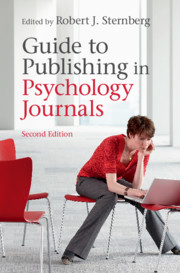Book contents
- Guide to Publishing in Psychology Journals
- Guide to Publishing in Psychology Journals
- Copyright page
- Contents
- Contributors
- Preface
- Part I Kinds of Articles
- Part II Parts of Articles
- Part III The Journal Submission and Resubmission Process
- Chapter 11 Writing for Your Referees
- Chapter 12 Dealing with Reviews and Overcoming Rejection
- Chapter 13 Rewriting the Psychology Paper
- Chapter 14 Writing a High-Impact Article
- Chapter 15 Article Writing 101
- Chapter 16 Selecting the Right Journal Outlet for Your Paper
- Chapter 17 Journal Publishing Strategies
- Chapter 18 Online Submission and Review Systems
- Part IV Systemic Issues
- Part V Conclusion
- Index
- References
Chapter 12 - Dealing with Reviews and Overcoming Rejection
from Part III - The Journal Submission and Resubmission Process
Published online by Cambridge University Press: 19 November 2018
- Guide to Publishing in Psychology Journals
- Guide to Publishing in Psychology Journals
- Copyright page
- Contents
- Contributors
- Preface
- Part I Kinds of Articles
- Part II Parts of Articles
- Part III The Journal Submission and Resubmission Process
- Chapter 11 Writing for Your Referees
- Chapter 12 Dealing with Reviews and Overcoming Rejection
- Chapter 13 Rewriting the Psychology Paper
- Chapter 14 Writing a High-Impact Article
- Chapter 15 Article Writing 101
- Chapter 16 Selecting the Right Journal Outlet for Your Paper
- Chapter 17 Journal Publishing Strategies
- Chapter 18 Online Submission and Review Systems
- Part IV Systemic Issues
- Part V Conclusion
- Index
- References
- Type
- Chapter
- Information
- Guide to Publishing in Psychology Journals , pp. 141 - 152Publisher: Cambridge University PressPrint publication year: 2018



